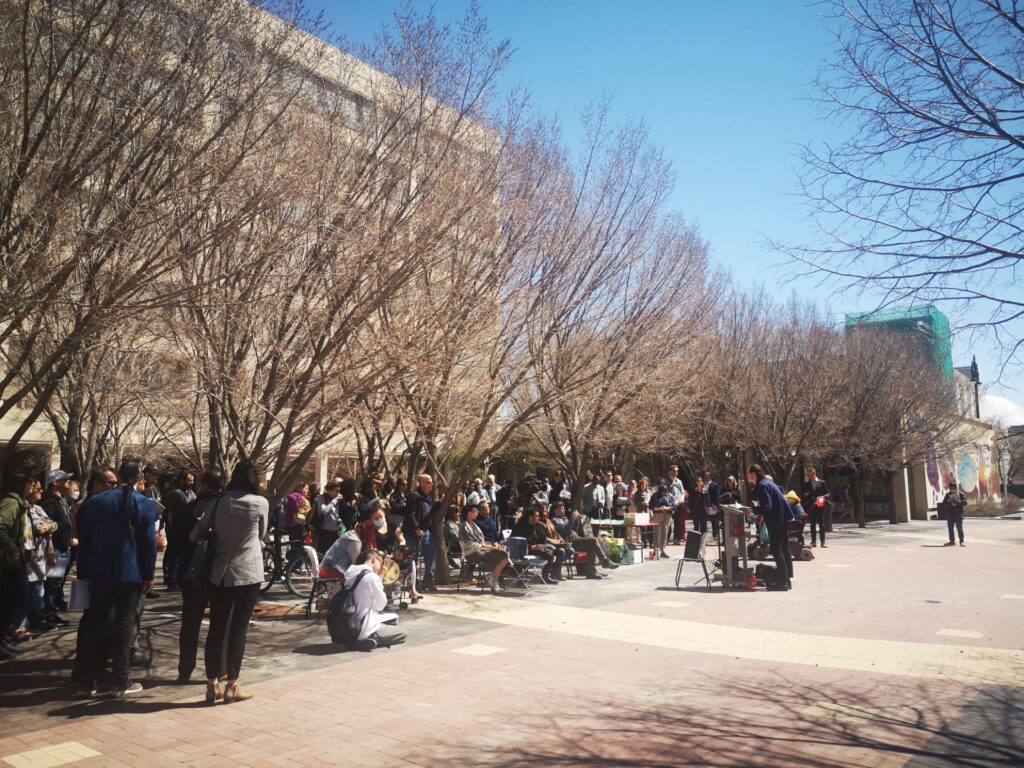By Niall Harney

Previously published in the Winnipeg Free Press June 8, 2022
It is an election year in Winnipeg and come October, a new mayor will be sitting in the City’s top seat. The 2022 Winnipeg Alternative Municipal Budget, “Winnipeg at a Crossroads”, released last month offers candidates and Winnipeggers a fully costed budget for the City of Winnipeg. Written by 27 authors from 18 community organizations, these Winnipeg policy experts direct Winnipeg to a more prosperous, inclusive and sustainable future.
Over the last two decades Winnipeg’s budget has been cut to the bone. A 14-year property tax freeze prior to 2012, followed by a decade minuscule tax increases for roads and rapid transit only, have left remaining city services, apart from police, starved of resources. The pandemic intensified Winnipeg’s financial woes, compounding cuts to transit, recreation, and libraries.
This year, Winnipeg is at a crossroads. The city is recovering from two tough pandemic years and with recovery comes opportunity to pivot. Recent polling by Probe research found Winnipeggers are willing to pay more for better services, but breaking from the status quo will require bold leadership from the next Mayor and Council. Three particular areas where action is possible are housing, policing, and transit.
Over 1,500 Winnipeggers are without a roof over their heads and an additional 34,000 live in inadequate housing. Winnipeg loses hundreds of low-rent housing units per year to demolition, disrepair, condo conversion, and rent increases, while most new development is too expensive to meet the needs of low-income renters.
A newly elected Mayor and Council must step up and provide resources to retain and develop deeply affordable units. Creating, buying and transferring vacant buildings to social, non-profit, and Indigenous housing providers is one way to do this. By working closely with neighbourhood renewal groups and non-profit developers the 150 unit annual development target set by Make Poverty History Manitoba could materialize.
Winnipeg should follow the lead of other Canadian cities and use its powers to increase the supply of non-profit, affordable housing. Such a program would meet an immediate need while creating community economic development opportunities.
Among Canada’s 10 major cities, Winnipeg spends the biggest share of its budget on policing: 27% in 2020. Police spending has increased over the last decade while funding for Community Services, which manages most of the City’s social development programs, has been slashed.
More policing does not translate into greater safety for the communities being policed. Community safety requires Winnipeg to develop programs that build healthy communities: decent housing, food security, poverty reduction, recreation and culture. These programs must be developed in conjunction with the Indigenous Relations Division and the Newcomer Welcome and Inclusion Policy. The Alternative Municipal Budget implements the Police Accountability Coalition’s call to cut police spending by 10% and allocates this $34 million annually towards Community Services and civilian crisis response initiatives.
Winnipeg Transit has yet to recover from service cuts implemented at the beginning of the pandemic. Two factors are making the revitalization of Transit more pressing than ever: the rising cost of living and climate change.
Private vehicle transportation produces 32.1% of Winnipeg GHG emissions while Transit produces just 0.8%. If we are going to cut emissions in line with global targets over the next decade more people need to be riding the bus.
To limit fuel costs more people are seeking alternatives to driving. Increasing bus ridership requires an efficient and reliable system. The Transit Master Plan released in 2021 offers a blueprint, but the City is implementing the plan over decades. With Federal money on the table, the next Mayor and Council could implement parts of this plan in a matter of years.
How do we pay for all of this? Winnipeg does not bring in enough revenue to pay for the services it needs. Over the last 20 years cities across western Canada have raised property taxes by an average of 180% while property taxes in Winnipeg have increased by just 22%. A majority of Winnipeggers have indicated they would be willing to pay $100 more in property taxes, above the rate of inflation, for better services. This amounts to about a 5% increase which, after adding a new rebate for low-income homeowners, would bring in $32 million per year.
The City should also look beyond property taxes to address its financial shortfall. The AMB uses pricing mechanisms to recoup the costs of expensive sprawl while incentivising the dense development that allows for greater public services.
Between now and October Winnipeggers have an opportunity to demand candidates commit to use high-quality public services and infrastructure to create a more just, liveable, and sustainable city.
Niall Harney holds the Errol Black Chair in Labour Issues at the Canadian Centre for Policy Alternatives. Winnipeg at a Crossroads: Alternative Municipal Budget 2022 is available at https://policyalternatives.ca/publications/reports/winnipeg-crossroads


